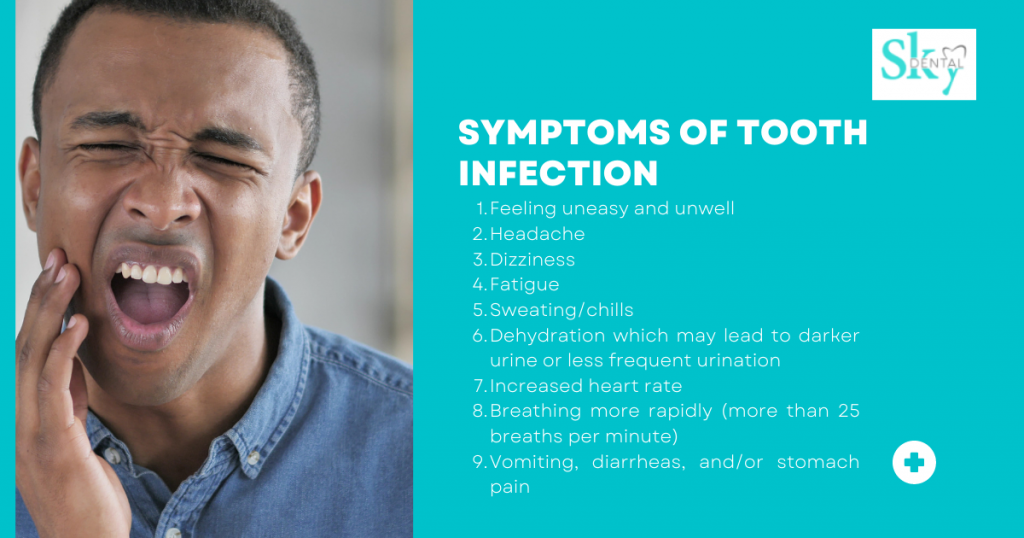TOOTH INFECTION
There are different ways that a tooth can get infected, but the most common one is when bacteria build up on a crack, cavity, or chip in the tooth. You are more likely to have a tooth infection if you: have poor dental hygiene, including failing to brush your teeth twice daily and failing to floss, a high-sugar diet that consists of consuming sweets and drinking soda, and dry mouth which is often caused due to aging or can also be a side effect of certain medications. A tooth infection that is left untreated and unchecked can progressively spread to other parts of the body and lead to serious medical issues. Untreated dental infections might gradually affect other parts of your body. If you have a toothache, which is already painful, see a dentist or oral surgeon to prevent it from spreading to other parts of your body.
SYMPTOMS OF TOOTH INFECTION
A toothache is the first symptom. Your tooth could become infected if you ignore your painful and throbbing tooth. Some common symptoms of tooth infection:
A PAINFUL TOOTHACHE
In most cases, tooth pain is caused by the exposed dental nerve. A throbbing ache that seems to be coming from deep inside your tooth may be experienced if you have a dental infection. However, there may be other causes for your tooth pain, so keep an eye out for any more signs of an infection.
SWELLING
Your cheek may swell if you have a severe infection. If the infection is in your tooth, the swelling may be minimal, but if it is in your gums, the entire side of your face may swell. If you do have severe swelling, this is an indication of an infection, and you need to seek urgent care or a dentist immediately. The bacteria could spread throughout your body and result in additional health issues if it enters your gums or jawbone deeply.
SENSITIVITY: INTOLERANCE TO HOT OR COLD FOODS AND BEVERAGES
Similar to the pain from a toothache, tooth sensitivity does not always indicate a dental infection. Due to various factors, many people may feel pain when they bite into something cold or sip something hot. It may be an infection, so you should visit the dentist if the sensitivity appears suddenly or if you feel strong sensations when drinking anything warm or eating something cold.
SWOLLEN LYMPH NODES IN THE NECK
The lymphatic system functions similarly to the body’s drainage system and is often successful in removing waste and maintaining the cleanliness and health of all your cells. However, your lymph nodes may normally swell if you have an infection or if your body is reacting to any kind of inflammation. Your head and neck are home to numerous lymph nodes. You may have an infection if the lymph nodes in your face and neck enlarge or feel hard to the touch. You should see your dentist if you detect any swelling or tenderness in your lymph nodes since this could indicate an infection.
FEVER
When you have dental issues, it’s typically normal for your temperature to be one or two degrees higher than usual. However, you shouldn’t wait to see a dentist or a doctor if your temperature is highly elevated or if it doesn’t return to normal in a day or two. Your body uses fever to either attack or fights an infection.
UNPLEASANT TASTE IN THE MOUTH
A salty or unpleasant taste in your mouth, which may be pus, is a sign that you may have an infection and should see your dentist.
SYMPTOMS OF TOOTH INFECTION THAT HAS SPREAD TO OTHER BODY PARTS
If a tooth infection is left untreated, it may spread to other parts of your body, which might be fatal. The following are signs and symptoms that the infection in the tooth has spread to other parts of the body. It takes time for tooth infections to spread to other parts. It progresses gradually and shows many symptoms and some of the most common ones are as follows:
- Feeling uneasy and unwell
- Headache
- Dizziness
- Fatigue
- Sweating/chills
- Dehydration which may lead to darker urine or less frequent urination
- Increased heart rate
- Breathing more rapidly (more than 25 breaths per minute)
- Vomiting, diarrhea, and/or stomach pain
WAYS TO AVOID GETTING A TOOTH INFECTION
In order to avoid cavities and tooth infections, you should:
Daily brush our teeth twice
Put fluoride toothpaste to use
Floss daily
Rinse with mouthwash before going to bed
Eat a balanced diet (limit the intake of sugar and refined carbohydrates)
Every six months have a professional cleaning of your teeth.
TOOTH INFECTION TREATMENT OPTION
Drainage – To drain the abscess, a dentist will make a tiny incision in your gums. However, this is commonly utilized as a temporary measure, and more treatments are frequently required.
Root canal – The tooth’s infected pulp is taken out during a root canal procedure. Carefully cleaned and filled cavities are placed inside the teeth. The tooth is then restored with the use of a crown.
Tooth extraction – If a root canal cannot save a tooth from an infection, it may need to be pulled.
Antibiotics – Drugs that can kill germs include antibiotics. They are occasionally used to treat infections in the teeth. You might be given oral antibiotics or intravenous (IV) medicines, depending on how serious your infection is.
CONCLUSION
If you have a toothache, which is already painful, see a dentist or oral surgeon to prevent it from spreading to other parts of your body. If the infection’s spread is not checked, it can be quite painful and it may interfere with your everyday routines.
Our dental hospital’s main objective is to emphasize your oral health and wellbeing from a young age. But Sky Dental Care is a dental clinic in Vijayawada that understands the complexity of every dental issue and treats it with the utmost care.


